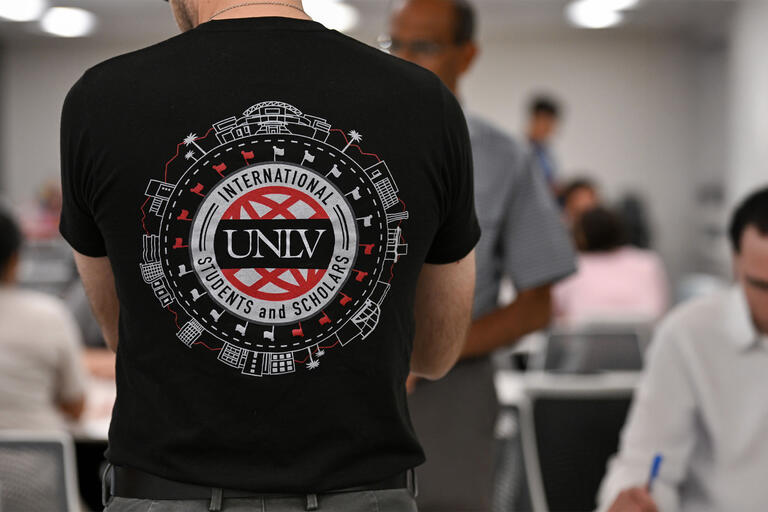Life can be scary for people facing medical conditions such as multiple sclerosis, Parkinson’s disease, and dementia.
But treatment — and hope — is available at the UNLV Medicine-Neurology Clinic.
At the clinic, located at 1707 W. Charleston Blvd., the department's staff treat about 350 patients each month with these and other neurological ailments, including carpal tunnel syndrome, stroke, dementia, epilepsy, and Huntington’s disease.
Frightening Symptoms
The majority of clinic patients are referred by primary care physicians unable to fully explain the frightening neurological symptoms their patients are suffering, said clinic administrator Mandy Canales. Muscle weakness, difficulties with vision and speech, monster headaches, and the inability to control body movement can be among the symptoms. Physicians set up treatment plans with the assistance of diagnostic tests that can assess brain activity and the health of muscles and the nerve cells that control them.
The good news, according to Dr. Miracle Wangsuwana, is that often new, promising medications are available. For instance, in 2005 when he first started treating multiple sclerosis (MS) — a disorder of the central nervous system marked by weakness, numbness, a loss of muscle coordination and problems with vision, speech, and bladder control — there were only four medications available to treat the disease.
“Now there are 15,’ said Wangsuwana, an assistant professor who teaches students problem-based learning. “Dealing with MS is much more promising. We’re able to give people a higher quality of life.”
Parkinson’s Disease
Dr. Eric Farbman said the options for medicines to treat Parkinson’s disease also have increased. Farbman has about 1,500 Parkinson’s patients, which represents about 10 percent of the people in Southern Nevada who have the disease, a disorder of the central nervous system that causes an individual to lose the ability to totally control body movements. The exact cause of the disorder is unknown, but it has been around a long time. In 1817, the physician for whom the disease is named, James Parkinson, called it “shaking palsy.”
“There’s a lot of research going on, a lot of drug trials,” said Farbman, a UNLV School of Medicine associate professor who oversees a movement disorders clinic and is a principal investigator of national Parkinson’s drug trials. “There’s real reason to be optimistic.”
Two to three times a month Farbman refers Parkinson’s patients to neurosurgeons for a procedure known as deep brain stimulation or DBS. Patients have electrodes implanted deep in their gray matter so that the electrodes can jam dysfunctional signals in the brain.
“If medication can help someone, I’m not going to refer them for surgery,” Farbman said. “It is, after all, brain surgery.”
In 2010 the Las Vegas Review-Journal did an article on a Parkinson’s patient Farbman referred for DBS. Prior to the 2008 surgery, that 53-year-old man had such a problem with balance that he often had to crawl around his home. He frequently couldn’t get into bed by himself. The bathroom was a challenge he couldn’t handle alone. Trembling and weak, he couldn’t cut his own meat at the dinner table. He needed to use a wheelchair.
The day after his surgery, with the electrodes in his brain activated, he walked around the block. Soon he was playing golf and was off all medication.
Today, that patient still is playing golf, but back on some medication, Farbman said. “The surgery doesn’t cure the disease. It still progresses.”
Migraine Challenge
The chair of the clinic, Dr. Abraham Nagy, who did his residency at Yale and completed a fellowship at the Institute of Neurology in Queen Square, London, is currently working four hours a week as he transitions out of private practice. His area of specialty is headache.
“People who don’t suffer from migraine or other headache disorders don’t understand the disability,” said Nagy, who will be teaching second-year medical school students a course in mind, brain, and behavior in his role as an associate professor.
“The World Health Organization ranks migraine in the top 10 most disabling conditions that people experience. They compare a day of migraine as being equivalent to a day of quadriplegia. If you can help people who are suffering from daily migraines or other disabling headache conditions and restore them to functionality — where they’re working and interacting with family — that’s very meaningful.”
Like Nagy, who now is recruiting another neurologist for the clinic, Wangsuwana is looking forward to the growth of the department.
“I want the Southern Nevada community to look at the department of neurology as a center of excellence,” he said. “We can make that happen.”



